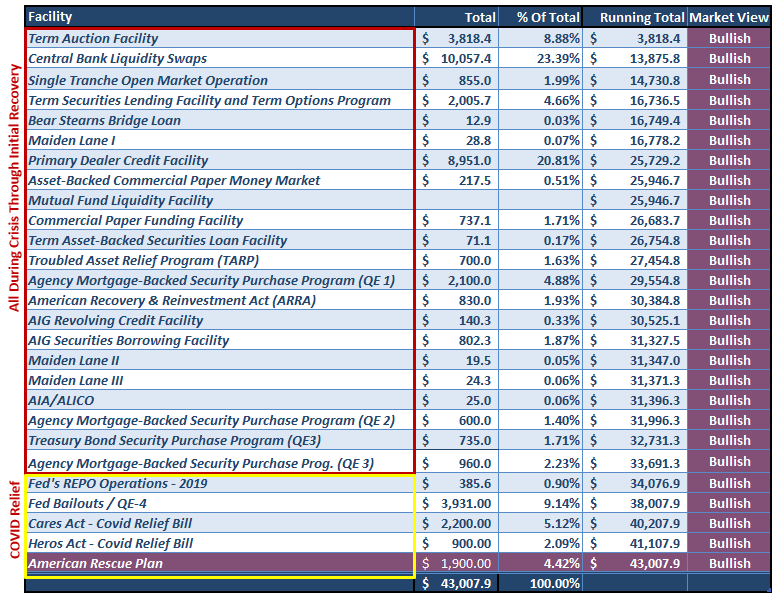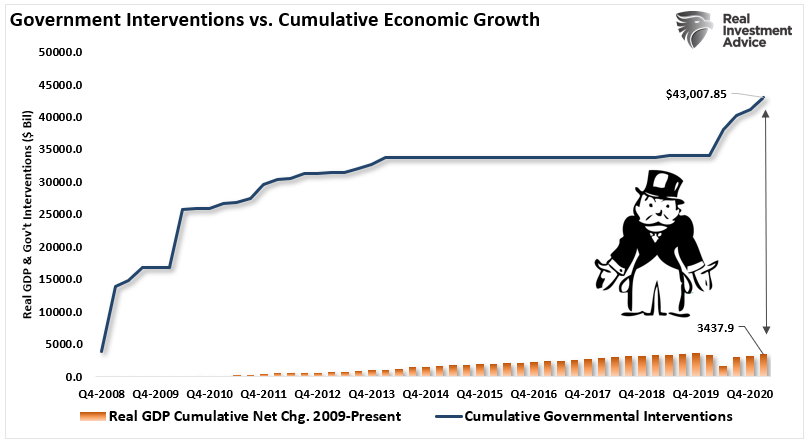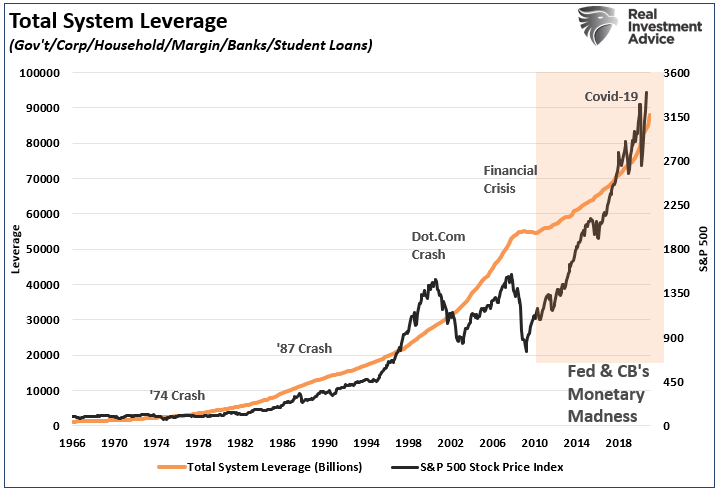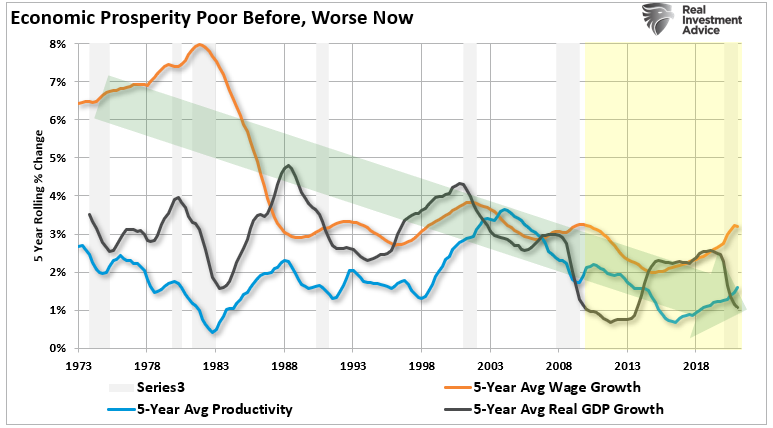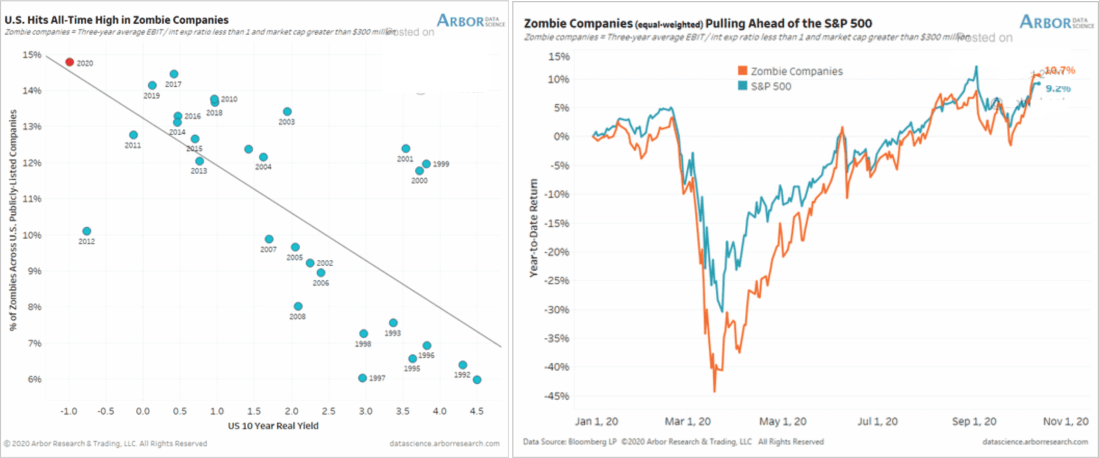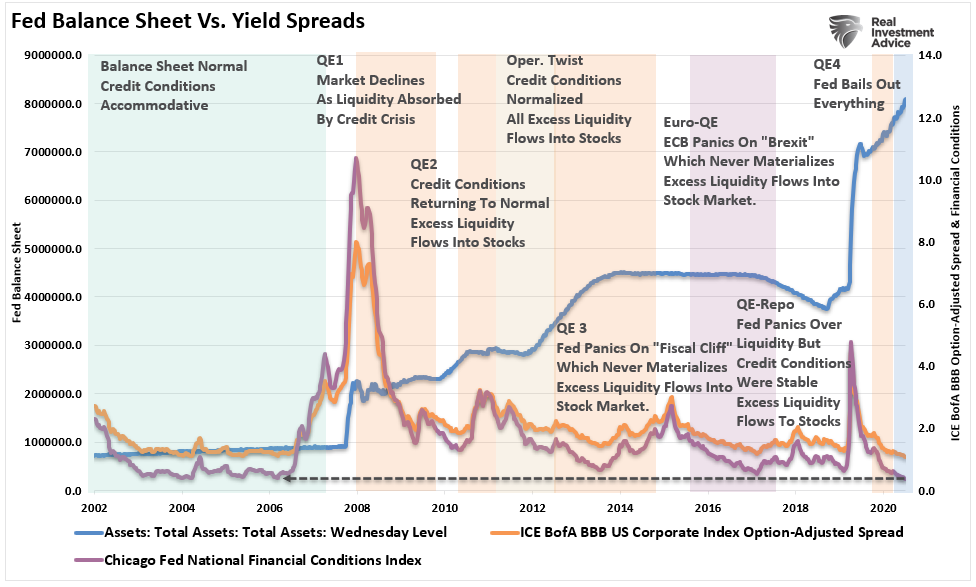Capitalism Is Darwinian
Capitalism, if allowed to operate, is a “Darwinian System.” As with Darwin’s theory of evolution, corporate evolution has the same essential components as biological evolution: competition, adaptation, variation, overproduction, and speciation. In other words, as an economic system, companies either adapt, evolve, and survive or become extinct.
In 2008, the Government and Federal Reserve began a process of “bailing” out companies that should have been allowed to go “bankrupt.” Instead, a decision got made to stop “capitalism” from proceeding with its “Darwinian” process. It all began with the initial bailout of Bear Stearns.
To date, the Federal Reserve, and the Government, have pumped more than $43 trillion into the economy to keep it “afloat.”
I say “afloat” rather than “growing” because, since 2008, the total cumulative growth of the economy is just $3.5 trillion. In other words, for each dollar of economic growth since 2008, it required $12 of monetary stimulus. Such sounds okay until you realize it came solely from debt issuance.
Failure To Allow Capitalism To Operate
We need that bit of history to understand why “bailouts are ruining capitalism.”
“Modern society looks increasingly to government for protection from major crises. Whether recessions, public-health disasters or, as today, a painful combination of both. Such rescues have their place. Few would deny that the Covid-19 pandemic called for dramatic intervention. But there is a downside to this reflex to intervene, which has become more automatic over the past four decades. Our growing intolerance for economic risk and loss is undermining the natural resilience of capitalism and now threatens its very survival.” – Ruchir Sharma
Sharma is correct.
Such was a point I recently discussed in “Recessions Are A Good Thing.” To wit:
“Just as poor forest management leads to more wildfires, not allowing ‘creative destruction’ to occur in the economy leads to a financial system that is more prone to crises.
Given the structural fragility of the global economic and financial system, policymakers remain trapped in the process of trying to prevent recessions from occurring due to the extreme debt levels. Unfortunately, such one-sided thinking ultimately leads to skewed preferences and policymaking.
As such, the ‘boom and bust’ cycles will continue to occur more frequently at the cost of increasing debt, more money printing, and increasing financial market instability.”
The Fed’s foray into “policy flexibility” did extend the business cycle. However, those extensions led to higher structural budget deficits. The cancerous byproduct of increased private and public debt, artificially low interest rates, negative real yields, and inflated financial asset valuations is problematic.
Specifically to Sharma’s point:
“However, these policies have all but failed to this point. From ‘cash for clunkers’ to ‘Quantitative Easing,’ economic prosperity worsened. Pulling forward future consumption, or inflating asset markets, exacerbated an artificial wealth effect. Such led to decreased savings rather than productive investments.”
The Fed’s “Moral Hazard”
“This is a dangerous form of denial. A growing body of research shows that constant government stimulus has been a major contributor to many of modern capitalism’s most glaring ills. Easy money fuels the rise of giant firms and, along with crisis bailouts, keeps alive heavily indebted “zombie” firms at the expense of startups, which typically drive innovation. All of this leads to low productivity—the prime contributor to the slowdown in economic growth and a shrinking of the pie for everyone.” – Sharma
By not allowing “recessions” to perform their natural “Darwinian” function of “weeding out the weak,” to Sharma’s point:
“Zombies’ are firms whose debt servicing costs are higher than their profits but are kept alive by relentless borrowing.
Such is a macroeconomic problem. Zombie firms are less productive, and their existence lowers investment in, and employment at, more productive firms. In short, a side effect of central banks keeping rates low for a long time is it keeps unproductive firms alive. Ultimately, that lowers the long-run growth rate of the economy.” – Axios
If capitalism were allowed to function, the weak players would fail. Stronger market players would acquire failed company assets. Bond-holders would receive some compensation for their debt holdings. Shareholders, the ones who accepted the most risk, would get wiped out.
Furthermore, assuming capitalism was allowed to function, investors would require appropriate compensation for the risk when loaning money to companies. As such, credit-related investors would get compensated for their risk rather than the current state of abnormally low yields for junk-rated debt.
Why is this currently the case? It is the direct result of the Fed’s creation of “moral hazard.” The definition of which is:
“A lack of incentive to guard against risk as investors believe the Fed is protecting them from the consequences of it.”
Why Wealth Inequality Is A Good Thing
Just recently, Aaron Back accidentally made a case for why we should foster “capitalism” over “socialism.”
“The introduction of capitalist reforms to Communist China has lifted hundreds of millions out of poverty, but it had a drawback: rising income inequality.”
Aaron’s rush to jump on the “inequality bandwagon” exposed the benefits of capitalism. Let’s break down his statement:
- The introduction of capitalism lifts millions out of poverty. (This is a good thing)
- Yes, capitalism created inequality as those that took advantage of capitalism prospered versus those that did not. (How capitalism works)
- If capitalism helped lift millions out of poverty, such suggests everyone was previously poor under communism.
Point 3 is the most important.
“Capitalism gets its power—and has created the greatest increase in social welfare in history—from embracing human ingenuity and the positive forces of innovation, open markets and competition. Perhaps the greatest strength of free markets is their ability to nimbly adjust to new ideas and situations and find the most efficient system. Markets are always looking to do things better. We can apply that same logic to capitalism itself to improve capitalism further so that it can provide even greater social welfare.” – Daniel LaCalle
Let me clarify something for you.
The ‘American Dream’ isn’t going into debt to buy a home. The ‘American Dream’ is the ability for ANY person, regardless of race, religion, or means, to achieve success, and in many cases great success, through hard work, dedication, determination, and sacrifice.
Capitalism Is The Worst, Except For All The Rest
One thing is for sure. Life isn’t fair.
“The rich have everything, and all I have is a mountain of student debt and a crappy job.”
Capitalism isn’t perfect, as Howard Marks recently noted:
“Capitalism is an imperfect economic system, because differential performance in the pursuit of economic success – as well as luck – results in there being (a) some people who are less successful as well as some who are more and (b) a few who are glaringly successful.
I’m 100% convinced that the capitalist system has produced the most aggregate gains for our society, exceptional overall progress, and a better life for most.
In the same way, I’m convinced that capitalism is the worst economic system . . . except for all the rest.”
Here is a hard truth for you.
“Capitalism is the only system that will provide you the ability to achieve unbridled success.”
Yes, the Government can pay for anything you want. The problem is that it requires those who are succeeding to pay for it.
Think about it.
Do you want to work hard, sacrifice, and take on an exceeding amount of risk to achieve success, only to pay for those who don’t?
Such is why socialism always fails.
“The greater good can only be achieved by making the good greater.” – Daniel LaCalle
Fixing What’s Broken
Is “capitalism” broken? No.
The problem is continuous interventions to halt the “Darwinian” function of “capitalism.” That brutal process must function; otherwise, it leads to “corporatism.”
While there is much complaining about “wealth inequality,” there is little “demand” to change it.
For example, if we were concerned about the monopolistic powers of companies such as Facebook (NASDAQ:FB), Twitter (NYSE:TWTR) and Google (NASDAQ:GOOGL) – we would stop using them. Without customers, these companies cease to exist.
However, we won’t do that because we want to conveniently complain about the injustices of the world on those platforms.
If we were upset about the executive compensation, we would stop buying Apple (NASDAQ:AAPL) products. But if we did that, how on earth would we access Twitter and Facebook to complain about the inequalities in the world.
Of course, we could also stop making executives rich. In that case, we only have to stop investing in the financial markets, and more importantly, demanding immediate access to information via our computers and social media.
The demand for information immediacy, and the decimalization of Wall Street, have pushed companies to use proforma accounting, gimmicks, and share buybacks to beat Wall Street estimates. But let me ask you, is it essential that a company beats their earnings by a single penny? Does such change the long-term valuation of the investment?
If you wanted to fix “capitalism,” you have the power to do so.
The problem is that you are unwilling to make the sacrifice needed to force a change.
Instead, you want the Government to fix the problem for you.
Of course, that is how “socialism” and “communism” came to be in the first place.
The current state of “capitalism” may seem broken, but every other form of an economic system leads to worse long-term outcomes for the average American.

